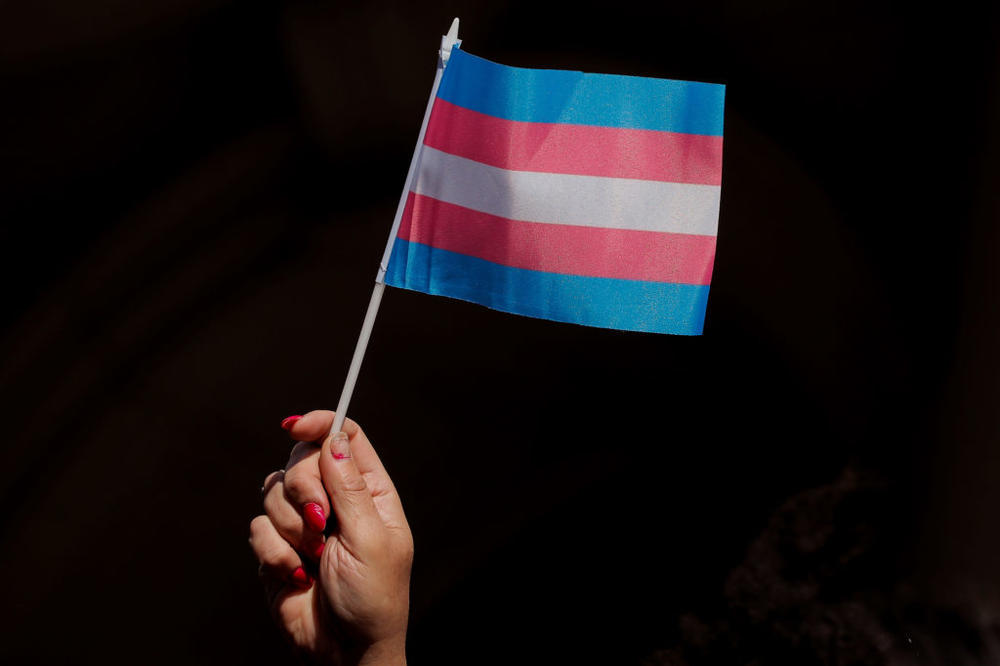
Section Branding
Header Content
Georgia Today: Spa shooting anniversary; Atlanta landmark returns to roots; GA teams in NCAA tourney
Primary Content
LISTEN: On the Thursday, March 16 edition of Georgia Today: It's the Atlanta spa shootings' anniversary; an Atlanta landmark returns to its roots; and two Georgia teams are playing in the NCAA tournament.

Peter Biello: Welcome to the Georgia Today podcast from GPB News. Today is Thursday, March 16. I'm Peter Biello. On today's episode, we'll learn about one lawmaker's effort to help police better understand the minority communities they serve; a downtown Atlanta cultural landmark is going back to its roots; and two Georgia teams — with very different resumes — get set to play in the NCAA tournament tomorrow. These stories and more are coming up on this edition of Georgia Today.
Story 1
Peter Biello: Georgia lawmakers gathered at the Capitol today to mark the two-year anniversary of the Atlanta area spa shootings, where eight people, including six Asian women, were murdered by a white gunman. Since then, one state representative has made it his goal to bridge the cultural gap between minority communities and law enforcement. GPB's Sarah Kallis reports from the state Capitol.
Sarah Kallis: Rep. Marvin Lim created a cultural competency training course for law enforcement. He hopes the course, offered by the Georgia Public Safety Training Center, will help law enforcement better understand diverse cultures.
Marvin Lim: If the goal is to facilitate reporting and to better relations by law enforcement, better understanding people in their own homes and parks in emergency situations, we will form better relations so that there will be a two-way conversation among law enforcement and communities.
Sarah Kallis: Lim says public safety concerns are often underreported in minority communities. The course went live this month. For GPB News, I'm Sarah Kallis at the state Capitol.

Story 2
Peter Biello: In a 96 to 75 vote, the Georgia House voted today to ban transgender minors from receiving some gender affirming care. That despite fierce protests from Democrats who warned of this restriction's negative consequences. GPB's Stephen Fowler reports.
Stephen Fowler: SB 140 would prevent doctors from providing hormone replacement therapy or gender affirming surgery for minors with gender dysphoria. Republicans say that care could cause irreversible damage. Leading medical groups oppose the bill, and Democrats like Rep. Teri Anulewicz said the GOP argument was hypocritical.
Teri Anulewicz: We have declared, in this chamber, parents are the first and most important teachers in a child's life, and they should have the freedom to choose the educational path that fits their child's needs. A question I asked in committee that was not answered and a question I put forth before each of you today is what makes this different?
Stephen Fowler: The House bill also removed language that would protect doctors who provide banned care from being held criminally liable. It now heads back to the Senate. For GPB News, I'm Stephen Fowler.
Story 3
Peter Biello: Also at the state Capitol, a bill that would ban the use of third-party grants in elections passed a key committee hearing yesterday. Senate Bill 222 bans counties from funding election efforts with anything but their own tax money or other governmental sources. It's partly a reaction to DeKalb County's use of a $2 million grant to fund its election office, which incensed Republicans and others who promoted falsehoods about voting. Another section of the bill seeks to declare DeKalb County retroactively in violation of rules and force them to pay the grant back. Democrats say that's probably illegal and will result in an immediate lawsuit. The bill could head to the House and then back to the Senate before the end of the session on March 29.
Story 4
Peter Biello: The Georgia House gave final passage yesterday to a bill aimed at preventing financial exploitation of seniors. Senate Bill 84 allows financial advisors to delay transactions involving their elderly or disabled clients if they suspect fraud. The legislation now heads to Gov. Brian Kemp for his signature. The House also unanimously approved legislation this week to require the state to assess whether educational requirements for many state jobs are necessary. That bill now heads to the governor's desk.
Story 5
Peter Biello: Family caregivers are at higher risk of emotional stress, depression and other health problems. But a group with the Georgia Department of Public Health is focusing on solutions. GPB's Ellen Eldridge has more.
Ellen Eldridge: The state's Alzheimer's and Related Dementias task force is working with local partners to educate and support family caregivers. Elizabeth Head is with the Georgia Department of Public Health. She says many are not aware of available resources.
Elizabeth Head: [A] trained leader takes individuals through six weeks of caregiving issues, both directed at issues you may face as a caregiver while caring for your loved one, but also turning it inward, in the care that you need to provide for yourself as a caregiver.
Ellen Eldridge: Head says Emory is currently testing its Tele-Savvy program, which would allow people to access the program from home. For GPB News, I'm Ellen Eldridge.

Story 6
Peter Biello: Former University of Georgia football player Jalen Carter has pleaded no contest to racing and reckless driving charges. The plea is in connection to the fatal crash that killed one of his teammates and a football recruiting staffer in January. His attorney said this morning that Carter has agreed to spend 12 months on probation and pay a $1,000 fine, among other requirements to resolve his case in Athens-Clarke County. The attorney says Carter never left the scene of and did not cause the accident that killed teammate Devin Willock and recruiting staffer Chandler LeCroy.

Story 7
Peter Biello: Atlanta's Rialto Center for the Arts is returning to its roots as an urban movie palace. Georgia State University announced Tuesday that the downtown venue has installed a new digital film projector and cinema screen. The cost? More than $300,000. Originally opened as a movie theater, the Rialto more recently has been known for music and stage performances. The center's executive director, Lee Foster, explains some of its history.
Lee Foster: We started in 1916 as The Piedmont, and then quickly came the Rialto. And then they had years of being just movies here. But then in the '80s, where the building and the area fell into disrepair, the then-president of Georgia State University, Carl Patton, had a vision that if the Rialto came back as part of their sort of effort toward the arts and — and arts that would bring the community in — that it would revitalize the whole area. And I think he was right. So we're very excited. And we've had many different movies here over the years. And I mean, even since it's become the incarnation of Georgia State, it's just that we had to build the screen each time we wanted to show anything. And we had a projector in the booth, but it's just not this professional level. Plus, the screen on the stage wasn't completely flat, and that's a problem. So this is amazing. It literally descends from — from the rafters and comes right down. And it's pretty extraordinary since it's like 1,600 pounds.
Peter Biello: Foster says the Rialto will continue to host music and stage performances, with film events rolling out later this year. Already, the Atlanta Film Festival has committed to a special screening in April, with further details expected soon. The news came weeks after the owner of Atlanta's historic Plaza Theatre, Christopher Escobar, said that he had signed a lease to reopen Atlanta's shuttered historic Tara Theatre.
Story 8
Peter Biello: And Valdosta's Wild Adventures theme park officially opened its latest edition Tuesday. Oasis Outpost is part of a multi-million dollar expansion at the attraction that officials estimate brings about $80 million annually to South Georgia.
Story 9
Peter Biello: Former Georgia poet laureate David Bottoms has died at the age of 73. He grew up in Canton, north of Atlanta, and went to Mercer University in the late sixties. That's where he saw a reading by poet Jim Seay. Here, he recalls the impact of that moment in an interview with the Georgia Writers Hall of Fame.
David Bottoms: I saw in Jim Seay that you could write about the American South. You could write about where you were from. You didn't have to write about Wales, didn't have to write about Paris.
Peter Biello: Bottoms says he became serious about writing after that. He went on to write a lot about his life in the South, publishing 11 collections of poetry and two novels. He also spent part of his career teaching. With me now is one of his former students who now teaches poetry and directs the creative writing program at Mercer University. James Davis May tell me about your experience with David Bottoms as your teacher. When did you meet him?
Peter Biello: Tell me about your experience with David Bottoms as your teacher. When did you meet him?
James Davis May: I met him in 2007. I had come to the Georgia State Ph.D. program to study with him. I remember reading his poems in the University of Houston library, where I was before, and thinking, "Oh yeah, this is — this is the person that I would like to study with."
Peter Biello: Really? What was it about his work that drew you to him in that way?
James Davis May: Well, at the time, American poetry was very cynical and it was sarcastic. And here was someone writing poems that [...] seemed like they were going after important things rather than being maybe too cool to risk feeling or more clever than the reader. These were poems that were trying to reach more significant things.
Peter Biello: I know he wrote a lot about baseball in his poems, and he spoke at readings about not being as good a hitter as a kid as a fielder, so he'd sit in the dugout and read books like War and Peace. But in those poems about baseball, he often had this way of just elevating them to something beyond a baseball poem, whether it's a story about his father or setting a scene that was really just poignant in its own right. But what can you tell us about his skill in elevating those ordinary things into something much more meaningful?
James Davis May: David believed that the purpose of poetry is to find significance in life. And that clip you just played was about how he learned through Southern poetry, looking for the things around him. ... You don't need to go to Paris to — to have a profound experience. You can go into your backyard. And so the background of his poems are Canton, Macon, Marietta, Atlanta. And so his whole idea was: He would tell us in class to "Turn your radio on." This is a phrase from a commercial, I think, a gospel commercial when he was younger. But the idea is the poet has some sort of receiver. And the job of the poet is to look at the world and find the significance in it, to find a deeper meaning.
Peter Biello: It's so funny that he used that because I had a professor in college — I studied fiction — who always said something about having antenna up — an antenna for emotion, and once that emotion becomes clear, follow it. Follow that emotion.
James Davis May: Yeah, absolutely. And so that was the whole idea to just pay attention to the world. And that's why in David's poems, you often see a lot of nature poetry or images from nature, but also a lot of images of his family, his parents, his wife, his daughter.
Peter Biello: So he's written several collections. Which one is your favorite?
James Davis May: So my favorite is We Almost Disappear, which I think it was writing a lot of the poems around the time that I was working with him and the book came out when I was in graduate school. And these are shorter poems and they're really about his family, about finding significance in the world around him.
Peter Biello: In addition to the comment about keeping your radio on, was there a piece of advice that he gave you that continues to help you as you write now?
James Davis May: One piece of advice, just practical advice, as part of being a father: My wife was pregnant my last year of my Ph.D., and we weren't financially sound at the time. And I remember him pulling me aside and he could tell I was very worried. And he pulled me aside and said, "Don't worry, it's all going to be good." And at the time, a lot of the male voices in my life were not exactly enthusiastic about being a father. And in his poetry, but also in just knowing him, he was a real positive voice for being a father, being part of a family. And you see that in his poems as well. But also, I was struck by something he said a little bit more practical to poetry. He said that a poet can't be a nihilist, that a poet always has to have a theological perspective. That doesn't mean the part has to be religious, but the poet has to believe that there's some meaning beyond just what's in front of us, and that it's the poet's job to search for that.
Peter Biello: What's something you'd like fans of his work to know about him, or is there — is there a poem that you'd really like to share with our listeners?
James Davis May: Yeah, absolutely. One thing I would want listeners to know is that sometimes poetry has a reputation of being coy, that the speaker is trying to hide something from us and trying to be vague. But in David's poems, he's very direct. And if you — you don't need a Ph.D. to appreciate his poems. And so I want to read a poem of his called "A Walk to Sope Creek." And it's a poem about, well, just what we've been talking about: going out into the world; seeing it; trying to find significance. And I'll go ahead and read it: "A Walk to Sope Creek."
"Sometimes when I've made the mistake of anger, which sometimes breeds the mistake of cruelty, I walk down the rocky slope above the ruined mill on Sope Creek where sweet gum and hickory weave sunlight into gauzy screens. And sometimes when I've made the mistake of cruelty, which always breeds grief, I remember how, years ago, my uncle led me, a boy, into a thicket of pines and taught me to kneel beside a white stone, the way a man had taught him, a boy, to pray behind a clapboard church. Sometimes when my heart is as dark as a stone, I weave between trees above that crumbling mill and stumble through those threaded screens of light, the way an anger must fall through many stages of remorse. Any rock, he allowed, can be an altar."
Peter Biello: Well. James Davis May, director of the creative writing program at Mercer University, thank you so much for speaking to me about David Bottoms. And so sorry for the loss of your friend and mentor.
James Davis May: Thank you, Peter.
Story 10
Peter Biello: Two Georgia teams are playing in the NCAA basketball tournament tomorrow. The University of Georgia women's team and Kennesaw State University's men's team. The KSU Owls go into their first-ever March Madness appearance on the heels of their first winning season since joining Division I in 2005. They are 26 and 8 this season. Tamica Smith Jones is the program administrator for men's and women's basketball at KSU. She says when the Owls take to the court, we can expect to see more of what the team has been building all season.
Tamica Smith Jones: Consistent play, very, you know, scrappy team there. They're very physical. They've got a lot of offensive threats. And they really can attack you in different ways. But they play so connected. They're together and they play for one another.
Peter Biello: KSU faces Xavier at 12:40 p.m. tomorrow. Meanwhile, the Lady Bulldogs face Florida State at 1:30 p.m. tomorrow to kick off their 36th NCAA tournament.
Peter Biello: And that is all we've got for this edition of Georgia Today. Thank you so much for listening. We hope you'll join us again tomorrow. We've got more Georgia news coming your way. If you've got feedback, we'd love to hear it. Send us an email. The address is Georgia Today@GPB.org. And as always, if you like this podcast, make sure you leave a review — that'll help other folks find us. I'm Peter Biello. Thanks for listening. We'll see you tomorrow.
___
GPB's Georgia Today newsletter hits your inbox on Tuesdays, Wednesdays and Thursdays with top stories from around the state featuring news, politics and more. Subscribe here.



